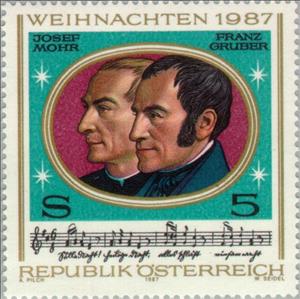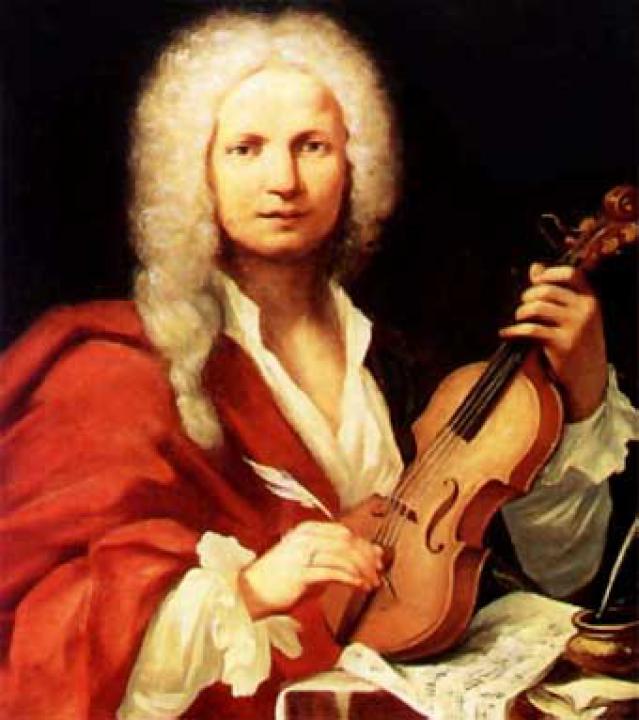Stamp: Josef Mohr (1792-1848) & Xaver Gruber (1787-1863) songwriter (Austria 1987)
Josef Mohr (1792-1848) & Xaver Gruber (1787-1863) songwriter (Austria 1987)
27 November (Austria ) within release Christmas goes into circulation Stamp Josef Mohr (1792-1848) & Xaver Gruber (1787-1863) songwriter face value 5 Austrian schilling
| Stamp Josef Mohr (1792-1848) & Xaver Gruber (1787-1863) songwriter in catalogues | |
|---|---|
| Michel: | Mi:AT 1908 |
| Stamp Number: | Sn:AT 1417 |
| Yvert et Tellier: | Yt:AT 1737 |
Stamp is square format.
Joseph Mohr was an Austrian Roman Catholic priest and composer, who wrote the words to the Christmas carol ""Silent Night"". Franz Xaver Gruber was an Austrian primary school teacher and church organist in the village of Arnsdorf. Gruber composed the music for the Christmas carol Silent Night.Stamp Josef Mohr (1792-1848) & Xaver Gruber (1787-1863) songwriter it reflects the thematic directions:
Music is an art form and cultural activity whose medium is sound organized in time. The common elements of music are pitch (which governs melody and harmony), rhythm (and its associated concepts tempo, meter, and articulation), dynamics (loudness and softness), and the sonic qualities of timbre and texture (which are sometimes termed the "color" of a musical sound). Different styles or types of music may emphasize, de-emphasize or omit some of these elements. Music is performed with a vast range of instruments and vocal techniques ranging from singing to rapping; there are solely instrumental pieces, solely vocal pieces (such as songs without instrumental accompaniment) and pieces that combine singing and instruments. The word derives from Greek μουσική (mousike; "art of the Muses"). In its most general form, the activities describing music as an art form or cultural activity include the creation of works of music (songs, tunes, symphonies, and so on), the criticism of music, the study of the history of music, and the aesthetic examination of music. Ancient Greek and Indian philosophers defined music as tones ordered horizontally as melodies and vertically as harmonies. Common sayings such as "the harmony of the spheres" and "it is music to my ears" point to the notion that music is often ordered and pleasant to listen to.
Christmas or Christmas Day (Old English: Crīstesmæsse, meaning "Christ's Mass") is an annual festival commemorating the birth of Jesus Christ, observed most commonly on December 25 as a religious and cultural celebration among billions of people around the world. A feast central to the Christian liturgical year, it is prepared for by the season of Advent or the Nativity Fast and initiates the season of Christmastide, which historically in the West lasts twelve days and culminates on Twelfth Night; in some traditions, Christmastide includes an Octave. The traditional Christmas narrative, the Nativity of Jesus, delineated in the New Testament says that Jesus was born in Bethlehem, in accordance with messianic prophecies; when Joseph and Mary arrived in the city, the inn had no room and so they were offered a stable where the Christ Child was soon born, with angels proclaiming this news to shepherds who then disseminated the message furthermore. Christmas Day is a public holiday in many of the world's nations, is celebrated religiously by the vast majority of Christians, as well as culturally by a number of non-Christian people, and is an integral part of the holiday season, while some Christian groups reject the celebration. In several countries, celebrating Christmas Eve on December 24 has the main focus rather than December 25, with gift-giving and sharing a traditional meal with the family.
A festival is an event celebrated by a community and centering on some characteristic aspect or aspects of that community and its religion or cultures. It is often marked as a local or national holiday, mela, or eid. A festival constitutes typical cases of glocalization, as well as the high culture-low culture interrelationship. Next to religion and folklore, a significant origin is agricultural. Food is such a vital resource that many festivals are associated with harvest time. Religious commemoration and thanksgiving for good harvests are blended in events that take place in autumn, such as Halloween in the northern hemisphere and Easter in the southern.
A composer is a person who writes music. The term is especially used to indicate composers of Western classical music, or those who are composers by occupation. Many composers are, or were, also skilled performers of music.
A musician is an artist who composes, conducts, or performs music. According to the United States Employment Service, "musician" is a general term used to designate a person who follows music as a profession. Musicians include songwriters, who write both music and lyrics for songs; conductors, who direct a musical performance; and performers, who perform for an audience. A music performer is generally either a singer, who provides vocals, or an instrumentalist, who plays a musical instrument. Musicians may perform on their own or as part of a group, band or orchestra. Musicians can specialize in a musical genre, though many play a variety of different styles, depending on the cultures and backgrounds involved. A musician who records and releases music can be known as a recording artist.




